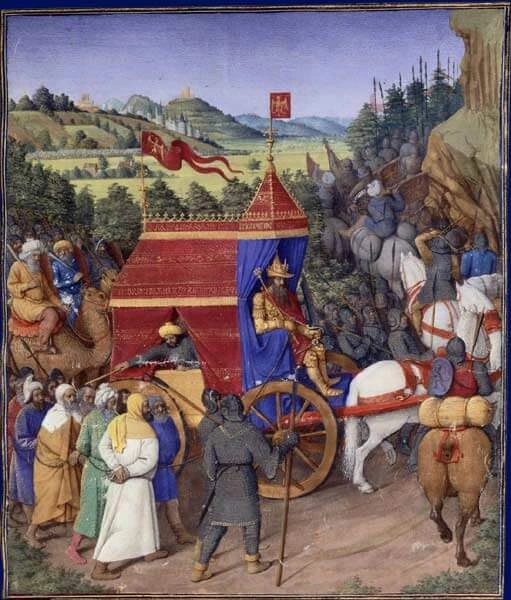1
And Jacob went on his way; and the angels of God met him.
2
And when Jacob saw them he said, This is the camp of God. And he called the name of that place Mahanaim.
3
And Jacob sent messengers before his face to Esau his brother, into the land of Seir, the fields of Edom.
4
And he commanded them, saying, Thus shall ye speak to my lord, to Esau: Thy servant Jacob speaks thus -- With Laban have I sojourned and tarried until now;
5
and I have oxen, and asses, sheep, and bondmen, and bondwomen; and I have sent to tell my lord, that I may find favour in thine eyes.
6
And the messengers returned to Jacob, saying, We came to thy brother, to Esau; and he also is coming to meet thee, and four hundred men with him.
7
Then Jacob was greatly afraid, and was distressed; and he divided the people that were with him, and the sheep and the cattle and the camels, into two troops.
8
And he said, If Esau come to the one troop and smite it, then the other troop which is left shall escape.
9
And Jacob said, God of my father Abraham, and God of my father Isaac, Jehovah, who saidst unto me: Return into thy country and to thy kindred, and I will do thee good,
10
-- I am too small for all the loving-kindness and all the faithfulness that thou hast shewn unto thy servant; for with my staff I passed over this Jordan, and now I am become two troops.
11
Deliver me, I pray thee, from the hand of my brother, from the hand of Esau; for I fear him, lest he come and smite me, [and] the mother with the children.
12
And thou saidst, I will certainly deal well with thee, and make thy seed as the sand of the sea, which cannot be numbered for multitude.
13
And he lodged there that night; and took of what came to his hand a gift for Esau his brother --
14
two hundred she-goats, and twenty he-goats; two hundred ewes, and twenty rams;
15
thirty milch camels with their colts; forty kine, and ten bulls; twenty she-asses, and ten young asses.
16
And he delivered [them] into the hand of his servants, every drove by itself; and he said to his servants, Go on before me, and put a space between drove and drove.
17
And he commanded the foremost, saying, When Esau my brother meets thee, and asks thee, saying, Whose art thou, and where goest thou, and whose are these before thee?
18
-- then thou shalt say, Thy servant Jacob's: it is a gift sent to my lord, to Esau. And behold, he also is behind us.
19
And so commanded he the second, and the third, and all that followed the droves, saying, According to this word shall ye speak to Esau when ye find him.
20
And, moreover, ye shall say, Behold, thy servant Jacob is behind us. For he said, I will propitiate him with the gift that goes before me, and afterwards I will see his face: perhaps he will accept me.
21
And the gift went over before him; and he himself lodged that night in the camp.
22
And he rose up that night, and took his two wives, and his two maidservants, and his eleven sons, and passed over the ford of the Jabbok;
23
and he took them and led them over the river, and led over what he had.
24
And Jacob remained alone; and a man wrestled with him until the rising of the dawn.
25
And when he saw that he did not prevail against him, he touched the joint of his thigh; and the joint of Jacob's thigh was dislocated as he wrestled with him.
26
And he said, Let me go, for the dawn ariseth. And he said, I will not let thee go except thou bless me.
27
And he said to him, What is thy name? And he said, Jacob.
28
And he said, Thy name shall not henceforth be called Jacob, but Israel; for thou hast wrestled with God, and with men, and hast prevailed.
29
And Jacob asked and said, Tell [me], I pray thee, thy name. And he said, How is it that thou askest after my name? And he blessed him there.
30
And Jacob called the name of the place Peniel -- For I have seen God face to face, and my life has been preserved.
31
And as he passed over Peniel, the sun rose upon him; and he limped upon his hip.
32
Therefore the children of Israel do not eat of the sinew that is over the joint of the thigh, to this day; because he touched the joint of Jacob's thigh -- the sinew.







